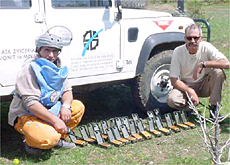Taking steps to raise mine awareness

Thousands of people will step onto a treadmill in Geneva this week to highlight the deaths and terrible injuries caused by landmines.
It comes as new UN member Switzerland has an early opportunity to showcase its much-vaunted commitment to human security.
The Swiss president, Kaspar Villiger, on Monday opened the fourth conference of states party to the Ottawa Treaty, which bans the use, stockpiling, production and export of anti-personnel mines.
But before he stepped up to the podium, Villiger stepped onto a treadmill, such as one would find in a gym.
“The slogan of this conference is ‘every step counts’. We are counting every step,” says the coordinator of the Swiss campaign against landmines, Elisabeth Reusse-Decret.
Two treadmills will be positioned near Geneva’s lakeshore, and over the course of the week, members of the public will be invited to raise awareness and money by walking or running for those unable to.
It is estimated that, every 20 minutes, someone somewhere in the world is killed or maimed by an anti-personnel mine.
In Cambodia, one in every 236 people is an amputee – 100 times the figure in the West. Forty per cent of landmine victims are children.
“We hope that by the end of the week, people will have taken a million steps on each treadmill,” Reusse-Decret says.
Vocal supporter
Switzerland was one of the first countries to ratify the convention, and one of the most vocal supporters of the Ottawa Treaty.
This week, one of its main objectives will be to push harder for more countries to sign up.
“The humanitarian nature of this convention needs to be stressed to the countries that have not signed,” says Janine Voigt, head of landmine issues at the Swiss foreign ministry.
“This is not a convention against war. It is aimed at strengthening human security. The victims are the focus of the convention,” she told swissinfo.
The Swiss will also be aiming to consolidate Geneva’s position as one of the main international centres in the fight against landmines.
It already is a focal point for this campaign, thanks to the largely Swiss-funded International Centre for Humanitarian Demining.
While the principal purpose of the meeting is to monitor progress in implementing the convention, the timing is crucial.
It will prepare the ground for a major review conference in 2004, and comes a year ahead of the first major landmark since the treaty came into force.
After ratifying the treaty, countries have four years to destroy their stockpiles of anti-personnel mines.
The deadline for the first batch of 80 countries falls in 2003. Switzerland is one of the countries overseeing the destruction of these stockpiles.
Dwindling funds
Under the treaty, states have ten years to demine their territory following ratification.
This is an expensive undertaking for many countries, and Reusse Decret wants to see richer countries doing more:
“Funds for demining and victim assistance are decreasing,” she says, adding that events since September 11 2001 have pushed landmines down the political agenda.
“Alas, it is no longer fashionable,” she says.
While attempts to remove anti-personnel mines have been successful in some parts of the world, notably the Balkans, in other regions – such as disputed Kashmir or in Chechnya – mines are being laid in ever-greater numbers.
Compared to other arms-limitation or disarmament conventions, the Ottawa Treaty has been strikingly successful.
In barely five years of existence, 144 states have signed the convention, of which 126 have ratified it.
Afghanistan, one of the most heavily mined countries on the planet, became the latest country to ratify last weekend.
“More and more states are getting engaged. But the work is far from complete,” Reusse-Decret says.
“There are some very important states which have not signed.” These include the likes of the United States, Russia, China, India and Pakistan.
Non-state actors
The 14 countries that continue to produce anti-personnel mines possess around 210 million of these weapons. Half of these are Chinese.
Many landmines around the world are deployed not by regular armies, but by rebel groups, and Switzerland would like to see these “non-state actors” incorporated into the treaty.
On this politically sensitive issue, the government backs the work done by the Geneva Call, a non-governmental organisation led by Reusse-Decret.
So far, she has persuaded five non-state actors – the two main groups in Iraqi Kurdistan, Sudan’s SPLA and two groups in the Philippines – to renounce the use of landmines.
“If we want a world without mines, we have to deal with these rebel groups,” Reusse-Decret says.
The Swiss government is less enthusiastic about two other suggestions from the NGOs, namely incorporating anti-vehicle mines and cluster bombs in the Ottawa Treaty.
The government feels that widening the convention to include these weapons would jeopardise efforts to achieve a universal ban on anti-personnel mines.
“It’s true that the effects of cluster bombs are often the same as landmines, but we must take one part at a time, so that our efforts are not wasted. If we enlarge the contents of the treaty, we threaten universality,” Janine Voigt says.
swissinfo, Roy Probert in Geneva
126 countries have ratified the Ottawa Convention.
The United States, Russia and China are among those that have not signed.
The fourth meeting of states party to the convention runs from September 16 – 20.

In compliance with the JTI standards
More: SWI swissinfo.ch certified by the Journalism Trust Initiative
You can find an overview of ongoing debates with our journalists here . Please join us!
If you want to start a conversation about a topic raised in this article or want to report factual errors, email us at english@swissinfo.ch.